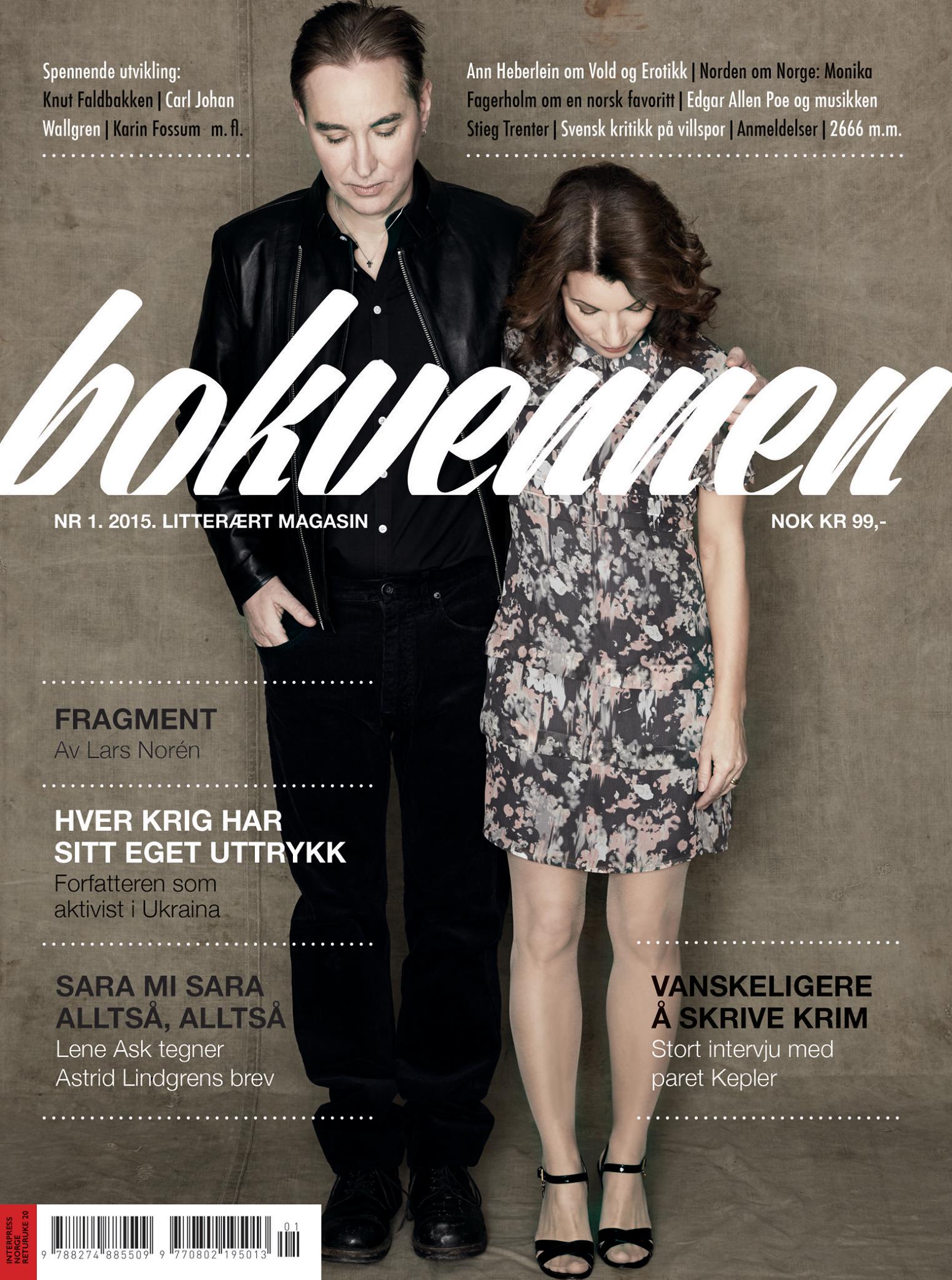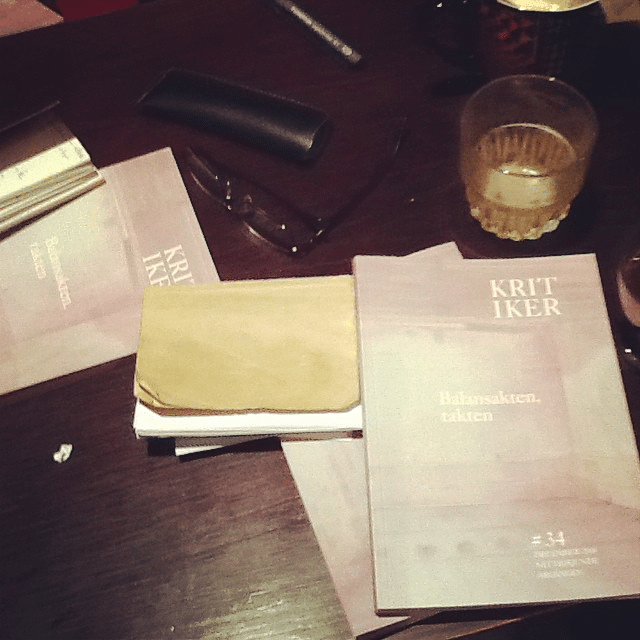Aktuellt
Samtal med Ilma Rakusa
”En resa genom Europa, språken, litteraturen och hemvisterna med Ilma Rakusa och Cecilia Hansson.” Foto: Per Bergström.
Ilma Rakusa är nyligt utkommen på Rámus med ”Vidare vatten”
(Översättning: Birgitta W Augustsson)
I drömmarna mellan fälten: snö
(Översättning: Linda Östergaard)

Bokvennnen, Norge, Ukraina
På torsdag utkommer nya numret av Bokvennen (Norges största litterära tidskrift). Det är det första numret med Alberte Bremberg som redaktör, och jag har intervjuat den ukrainska poeten Serhiy Zhadan.
Ilma Rakusa och Cecilia Hansson – Parallella världar
Ett samtal om ensamhet och tillhörighet, om att leva med flera språk, och om hur dikten förvandlar främlingskap till hemvist.
Goethe-Institut, torsdag 12/3 2015, kl. 18
Ilma Rakusa Ilma Rakusa (f. 1946) är poet, översättare, prosaist, essäist och litteraturvetare. Hon föddes i Slovakien av en slovensk far och ungersk mor, växte upp i Budapest, Ljubljana och Trieste och kom 1951 till Zürich. Hon är medlem av Tyska akademin för språk och diktning och har skrivit ett 20-tal böcker samt översatt författare som Péter Nádas, Danilo Kis, Margurite Duras, Imre Kertesz, Leslie Kaplan och Anton Tjechov till tyska. Vidare vatten (Översättning: Birgitta W Augustsson) som nu kommer på svenska är den suggestiva skildringen av en nomadisk barn- och ungdom på 1950- och 1960-talet, en gripande biografi som förtjänat sin plats på bestsellerlistorna och det schweiziska bokpriset.
Cecilia Hansson Cecilia Hansson (f. 1973 i Luleå) debuterade som poet 2002 med den lyriska berättelsen Revbensdagar, morgnar. Fjärde diktsamlingen, Loveprosjekt, skrevs i samarbete med den norska författaren Inger Bråtveit. Fil. mag. i tyska. Har arbetat som reporter/programledare på Sverige Radio, tysklärare och skrivarkurslärare. Har även ett internationellt engagemang, främst för Centraleuropa och Kina. Även verksam som översättare från tyska. Har bland annat översatt de tyska poeterna Monika Rinck (tillsammans med Anna Lindberg) och Nora Gomringer. Ingår sedan 2013 i styrelsen för Sveriges Författarförbund.
Stockholm: Bryggargatan 12 A
Fri entré, obligatorisk anmälan:
Språk: Tyska, simultantolkas till svenska
anmalan@stockholm.goethe.org
”Att skriva historien medan den pågår” på Fyren på Sveriges Författarförbund.
4 december samtalade jag med Ellen Engelstad, Annette Rosengren och Kajsa Ekis Ekman om att skriva i och om krisens Europa – om vad krisen betytt för människorna, men också för kulturen och litteraturen i de drabbade länderna.
Vilka särskilda utmaningar ställs en författare som försöker teckna en bild av ett pågående historiskt skeende inför? Hur skiljer sig det dokumentära skrivandet från det skönlitterära? Går det alls att dra en skarp gräns mellan fack- och skönlitteratur?
Allt detta på Fyren på Sveriges Författarförbund.
Fyren på Sveriges Författarförbund

Panelsamtal på Fyren 4 december: ”Att skriva historien medan den pågår.”
Fyren 4 december – Att skriva historien medan den pågår
När Ellen Engelstad, Kajsa Ekis Ekman och Annette Rosengren gästar Fyren lyfter vi blicken utanför Sveriges gränser. Det blir ett samtal om att skriva i och om krisens Europa – om vad krisen betytt för människorna, men också för kulturen och litteraturen i de drabbade länderna.
Vilka särskilda utmaningar ställs en författare som försöker teckna en bild av ett pågående historiskt skeende inför? Hur skiljer sig det dokumentära skrivandet från det skönlitterära? Går det alls att dra en skarp gräns mellan fack- och skönlitteratur?
Ellen Engelstad är kultur- och vetenskapsredaktör på Manifest Tidsskrift (Norge). Hon är litteraturvetare och jobbar med en bok om unga människor i Sydeuropa efter finanskrisen.
Kajsa Ekis Ekman är journalist, författare och kulturdebattör. Hennes senaste bok är Skulden: eurokrisen sedd från Aten (2013).
Annette Rosengren är etnolog och författare med deltagande observation som arbetsmetod. Tidigare i år utkom hennes bok Springa på vatten: Transit Grekland: om flyktingar och immigranter i EUs utkant
Samtalsledare: Cecilia Hansson
Alla intresserade är varmt välkomna!
Tid: 19.00-21.00
Plats: Författarnas hus, Drottninggatan 88 B i Stockholm.
På Fyren på Sveriges Författarförbund anordnas panelsamtal kring litterära teman. Fyren drivs av författarna/översättarna Gunnar Ardelius, Naima Chahboun, Cecilia Hansson och Sanne Näsling.
Respons – om det förlorade paradiset
Pehr Mårtens skriver på sin blogg:
Comment to a conversation held in Stockholm September 30, 2014:
There are indeed many passages of this conversation on digitalisation and attention-crisis, focusing on reading and translating, that are worthwhile to cite. I even think the whole conversation would benefit from being transcripted and published, perhaps with some minor editing. I, personally, fell especially for a certain passage at 1:23:48 into the recording, when the translator Cecilia Hansson speaks from her heart, in some very fragile wording, starting with commenting on the previous speaker:
”I want to refer to something you said before about care, graveyard and contemplation, because […] I have the feeling when we have these discussions, I realize that I have lost something […] something important, and I don’t know what it is, perhaps the Paradise [noisy recording, is it Paradise she is saying?] … […] and now when I work I try to isolate myself, I go to an apartment where nobody can reach me, where the internet connection is quite bad also […] I read there […] I feel a bit crazy when I go there, because it’s so unmodern in some way…”
I also wonder what is lost. And what interest me more in this citation is the way Cecilia Hansson seamlessly jumps from the feeling of an unspecified loss, to searching and finding herself in another place, out of reach, where internet signals are too weak, as a kind of remedy. I have to ask myself: Why is this seclusion and escape from everything and especially the internet becoming a necessity in trying to regain that what is lost. I have a hypothesis, though, there could be many other, that what is lost is privacy in the act of reading, when you read a text over the internet. The confidentiality is broken, between me and the text that I am reading. The safety in the reading act is gone. It has become an untrusty relation. This is so because of the fact that every move you do on the internet is recorded, every text you read adds to the profiling of your person. It is as if a big robot is reading over your shoulder, that what you are reading. Thanks to the Snowden revelations we know that this is made with different programs that intercept and scan the entire internet with algorithms for the sake of national security. As this problematic of the recent internet debate didn’t surface in the conversation I just want to add something that I learnt on surveillance in relation to literature and reading. Let me cite Eben Moglen at Columbia Law School on November 13th, 2013:
“The anonymity of reading is the central, fundamental guarantor of freedom of the mind. Without anonymity in reading there is no freedom of the mind. Indeed, there is literally slavery.
I don’t ask you to accept that statement on my authority, I offer you the authority of a better man than I, who in 1845 published the first of his memoirs, called A Narrative of Frederick Douglass: an American Slave.
Frederick Douglass wrote in that first narrative of his life how his second owner, Mrs. Sophia Auld, when he was twelve began to teach him letters, and to read a few simple words. But she was vehemently discouraged by her husband Hugh, who told her, when he came to understand what she was doing, that “You cannot teach slaves to read for it, will make them uneasy in their slavery, unmanageable and sad.” Frederick Douglass said “I now understood what had been to me a most perplexing difficulty — to wit, the white man’s power to enslave the black man.” Thus he began to learn more to read, and when Ms. Auld, having accepted her husband’s direction in the matter, found him reading a newspaper, she tore it away from him lest he become unfit for slavery. Thus he was required, as he tells us, to learn to read in secret.
When hired out to Mr. William Freeland, he taught other slaves to read, until such time as the surrounding slave owners became aware of what he was doing, at which point the mob invaded his Sunday schooling place and beat the people and destroyed the school.
Reading was the pathway, Fredrick Douglass wrote, from slavery to freedom. But what if every book and newspaper he touched reported him?
You can go and read almost anything you want, almost any book on Earth, at the headquarters of one of the great American data-mining companies, provided that you let them watch you as you read every page. All books, for free, in the KGB library of Mountain View, California.
Everyone tries to surveil your reading.
If you have a Facebook account which you use, that is you log in from time to time, then not only will Facebook be surveilling every single moment you spend at Facebook — watching what you read, how long you read it, what you do next, where you go to, what you click on from there, etc. — but also every Web page that you touch that has a Facebook “like” button on it, whether you click the “like” button or not, will report your reading of that page to Facebook.” End of citation.
Once I curated an exhibition for the Museum of Architecture on the thematic ”The Inner Space” as I imagined a space for secrets, a completely non-transparent space. A hide out. In doing the research I came across the greek philosopher Epicurus, who decided to withdraw from the polis Athen, and stay in the countryside. His motto was *Lathe Biosas*, translated as ”live in obscurity”. Epicurus argued that to have secrets was a prerequisite to have friends, you entrust somebody with the confidence to share a secret. Furthermore he maintained the opinion that friendship, the institution itself, was a necessity in any attempt to achieve happiness. Thus, the dimensions of the loss of privacy, via the loss of anonymity of reading, are huge. This is why I am so curious to know whether Cecilia Hansson’s word (that was so difficult to hear in the recording above) in her input to the conversation really was: Paradise. (Now confirmed.)
https://medium.com/@PehrMartens/comment-to-a-conversation-on-translating-poetry-in-the-postdigital-era-held-in-stockholm-689c8762b631






